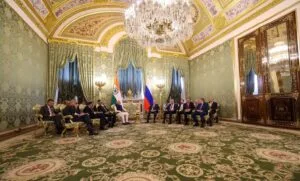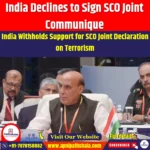PM Modi’s visit to Russia on July 8-9 for the 22nd India-Russia Annual Summit. This visit is notable as it’s his first trip to Russia since the Russia-Ukraine war began in February 2022.
Why is PM Modi’s visit to Russia in the News?
- Prime Minister Narendra Modi arrived in Moscow on Monday (08 July) and Tuesday for two-day high-profile visit to Russia. He was greeted at the airport by Denis Manturov, Russia’s first deputy prime minister.
- The two leaders have met a total 16 times since Modi became Prime Minister, but not since Russia invaded Ukraine in February 2022, provoking wide-ranging Western sanctions. Modi last went to Russia for the Eastern Economic Forum meeting in Vladivostok in September 2019; Putin last visited India in December 2021 for the annual bilateral summit.
Why the Indian Prime Minister’s Visit to Russia is Particularly Significant this Time
- First since Russia’s invasion of Ukraine:
- This will be the first bilateral meeting between the Indian Prime Minister and Russian President Vladimir Putin since Russia invaded Ukraine in February 2022. The two leaders have met 16 times since 2014. The Indian Prime Minister last visited Russia for the Eastern Economic Forum in Vladivostok in September 2019. The Russian President’s last visit to India was in December 2021 for the annual bilateral summit.
- Traditions broken:
- By choosing Russia for his first bilateral visit after being sworn in, the Indian Prime Minister has broken with the tradition of a new Indian PM first travelling to a neighbouring country. For example, he visited Bhutan in June 2014 and the Maldives and Sri Lanka in June 2019. He travelled to Italy last month, but that was for a multilateral G7 leaders’ meeting.
The importance of the Indian Prime Minister’s visit to Russia:
- A Foreign Policy Priority:
- The relationship between Russia and India spans seven decades, originating from the USSR era, marked by generosity and friendship that has persisted in modern Russia.
- Today, the strongest aspect of their strategic partnership is defence, although significant collaboration exists in space and nuclear fields as well.
- The relationship between Russia and India spans seven decades, originating from the USSR era, marked by generosity and friendship that has persisted in modern Russia.
- Global Significance:
- Their bilateral meeting coincides with the gathering of leaders from 32 nations in the North Atlantic Treaty Organisation (NATO) in Washington DC, celebrating 75 years of the anti-Russia military alliance.
- Russia’s Deepening Ties with China:
- As India has diversified its relationships in a multi-polar world, some areas of the India-Russia relationship have stagnated.
- Conversely, Russia has strengthened its ties with China, which has offered diplomatic and economic support to Moscow amid Western sanctions due to its conflict with Ukraine.
- Although Russia does not share with any other country the military technologies it shares with India, India must continually monitor the weaponry and technologies that Moscow provides to Beijing.
Primary Areas of Cooperation Between India and Russia
- Defence/Military:
- During the Cold War, the USSR was the primary supplier of defence equipment to India.
- Today, it is estimated that 60-70% of India’s defence equipment originates from Russia and the Soviet Union.
- Defence cooperation between India and Russia has evolved from a simple buyer-seller relationship to one involving joint research and development, co-development, and joint production.
- Agreements have been signed for the supply of S-400 Triumf mobile surface-to-air missile systems, MiG-29 fighter aircraft, and Kamov helicopters, as well as the licensed production of T-90 tanks, Su-30MKI fighters, AK-203 assault rifles, and BrahMos supersonic cruise missiles.
- Additionally, the INS Vikramaditya, one of the Indian Navy’s two aircraft carriers, was formerly the Soviet and Russian warship Admiral Gorshkov.
- During the Cold War, the USSR was the primary supplier of defence equipment to India.
- Oil/Petroleum boost:
- Since the onset of the war in Ukraine, India has been purchasing large quantities of discounted Russian oil to mitigate the inflationary impact of rising crude prices.
- Despite international criticism, India’s External Affairs Minister has stated that India will continue to buy Russian oil to protect the interests of Indian consumers.
- Trade (Import/Export):
- The purchase of Russian crude has significantly boosted bilateral trade volumes between India and Russia, surpassing expectations and targets.
- Prior to the war, the bilateral trade target was set at $30 billion by 2025.
- However, in the fiscal year 2023-24, bilateral trade reached an all-time high of $65.70 billion.
Obstacles for India in Sustaining its Relationship with Russia
- Balance of trade heavily in Russia’s favour: India imports $61.44 billion worth of goods from Russia, primarily consisting of Russian oil and petroleum products, fertilizers, mineral resources, precious stones and metals, and vegetable oils.
- Walking diplomatic tightrope: While New Delhi has not explicitly condemned the Russian invasion, it has voiced concerns over threats of nuclear war made by Russian leaders.
- India has abstained from voting against Russia in several UN Security Council resolutions.
- Maintaining ties with Western nations: The Russia-Ukraine war has placed India in a delicate diplomatic position with its Western allies.
- This is highlighted by a series of meetings between India and Western nations just before the Indian Prime Minister visits Russia.
- Looked upon as a mediator: There is a perception that India is positioning itself as a neutral party that could mediate between Russia and Ukraine.
- Presence of Indians in Russia: Some Indians in Russia are believed to have been “misled” into joining the war in Ukraine. New Delhi has requested their early discharge, and this issue is expected to be discussed during the Indian Prime Minister’s visit.
- The Future Path for India: India’s primary focus will be its defence ties with Russia, given that the Moscow-Beijing alliance contradicts Indian strategic interests. Therefore, the Indian Prime Minister’s visit aims to bolster the longstanding bonds between the two nations and to prevent Beijing from influencing their relationship.
Explore our courses: https://apnipathshala.com/courses/
Explore Our test Series: https://tests.apnipathshala.com/
Download RNA PDF: https://apnipathshala.com/rna-real-news-and-analysis-08-july-2024/










